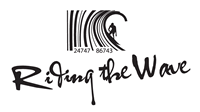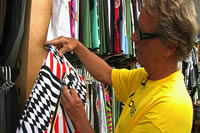Riding the Wave – Chris Cutri Interview

Business is Business is the title of a French film whose main character is “a figure who makes money from everything and spreads his tentacles out over the world” (Wikipedia). Perhaps this is not a bad analogy for the way some surfing companies are run. One way to understand the current state of the surfing business world is through a documentary entitled Riding the Wave by filmmaker Chris Cutri.
In the film, Cutri interviews the likes of Steve Pezman, Dave Parmenter, Bob McKnight, Paul Naude and Bob Hurley touching on the commodification of the surf industry and what it means to the sport. As in any good documentary we see varied view points about the commercialization of surfing. Crowding in the lineup, fashion and peer pressure, surfing history, are all discussed at length. Pezman, possibly the most eloquent of the bunch, talks about the essence of surfing. Naude talks about the benefits of the growth of the sport such as modern high performance boards and ultra-flexible warm wetsuits. In the end the film is well researched and displays the dynamic between the soul of what surfing culture means for many and its mainstream reality today.
It should not come as a surprise that the film is not receiving much publicity in the mainstream surf media. Transworld Business practically dismisses the film. In spite of that, the film has had great responses. It recently played at the Surfilm Festibal 5 in Spain where it sparked exciting dialog amongst the participants. The film is of particular interest for those of us who are questioning our own involvement in surfing and wonder how our purchases affect the direction of our pursuit on the world market. We asked Cutri for an interview and he graciously agreed.
The film is available online or you could ask your local surf shop to stock it. As always we welcome your comments and feedback.
Q. What is your relationship to surfing and what inspired you to make this film?
I grew up in Southern California. I Boogie Boarded as a kid, and then got into surfing in my early teens. A friend of mine from Orange County who surfed brought up this notion of how this sub-culture had gone mainstream and that there was a “price of entry”. The clothing, boards, and other surfing paraphernalia are really expensive. All of these factors contributed to me wanting to pursue this project. The film at a certain level is a critique about me personally. I have definitely felt the pure experiences of wave riding and being connected to the ocean, but as I look back, I feel my initial intentions where not as pure. I feel that I was the classic California character Parmenter describes in the film– one who was trying to be cool, get dates, and trying to distinguish himself.
Q. I first learned about this film through the Surfilm Festibal in Spain a few weeks ago where it was well received. What kind of reactions have you had with the surf media here in North America? How is the film being distributed?
The festival really validated the film for me. I received some real positive comments from people who are very legitimate and respectful within the surf community. I really appreciated that. Steve Pezman told me that The Surfer’s Journal is going to do a small blurb on the film. I have sent the film to some other big mag’s, and I have received responses that seemed indifferent or somewhat critical of the piece. The film is currently being distributed via Brigham Young University. (www.ridingthewave.byu.edu)
A large distributor is currently looking at the film for distribution.
Q. You approach the subject of the commodification of surfing from various voices including the purists, the capitalists and the consumers. And obviously as a documentary filmmaker your goal is to be objective. But how did you feel about the topic going into the film?
I think that is a very good question. I don’t believe anything is ever really objective, but as a filmmaker I tried the best I could to show both sides and let the viewer decide what they want to make of the subject matter. With that said, I definitely had some preconceived notions about the topic. I did feel that this particular sub-culture was being co-opted, and I especially felt that one of the main reasons youth culture was participating in this lifestyle was for identity/self-esteem purposes. With the film being completed now, I still feel these things, but one of the biggest realizations that I have come to is that the whole issue is much more complex than I thought when I started. It’s not so black and white and pointing the finger at a certain thing or person has become much more difficult.
Q. Dave Parmenter alludes to the fact that surfing has gone through many phases of popularity. It seems that it’s certainly peaking now with so many people wearing surf fashion and the proliferation of cheaper boards from overseas. Do you think that perhaps it’s reached a peak and will be loosing its cool factor again soon?

TK Brimer of FrogHouse
Newport Beach, California
I really can’t see it slowing down. This is one of the peculiar things about surfing. As other marginalized activities become popular, they usually self extinguish. I don’t foresee that happening with surfing no matter how popular or commercial it gets. When speaking with Alex Dick-Read of the Surfer’s Path in San Sebastian, he made one of the most insightful comments I have ever heard about surfing. In affect, he said that surfing is a free ride with the universe. These waves come as a package of energy, and then you get to ride it. You’re literally going with the universe. In simpler terms, there’s “something” about surfing-the ride-that will always be so desirable. Yes, some may just cling to the “image”, but even at that level I think it will always be desirable.
Q. In an earlier post we talked a bit about crowding in the line-up and how this has changed our experience. As Paul Naude states it’s easy to blame crowding on the corporatization of surfing but the truth is that our population size in North America has exploded since the Gidget days. Do you feel that surfings’ past has been romanticised?
I think it has to a certain extent. It seems somewhat legitimate in terms of surfing in less crowded spots and feeling a sense of “exclusivity” in relation to the dominant culture. But we definitely have benefited from the progress of today’s surfing in terms of wetsuits, board design, leashes, etc. So there were some definite benefits to the past, but at another level, it’s great to be a surfer in the twenty first century.
Q. Parmenter describes surfers as having an “aristocratic detachment” to the world and that surfer’s are “cooler than the average person.” It’s a bold statement and I think that it resonates for many of us. But is that what is actually being packaged and sold?
I never thought of it in that particular way, but I think you’re right. When I was filming, I found some of the Volcom slogans stating, “Youth against the establishment.” It’s an interesting statement to make when that company is being traded on the stock market. The notion of what is inherently “cool” in surfing is a peculiar phenomenon. Why aren’t people wearing NASCAR t-shirts all around the world? What is it specifically about the surfing culture that makes it so cool?
Q. What type of responses have you received from pro surfing?
The film is so new, I’m not sure if it has been viewed by many pro surfers yet. I’ll be curious to see what their take is.
Q. What was it like talking with Steve Pezman?
My cameraman who filmed Steve didn’t really know anything about surfing. When the interview was over, he was just blown away by his insight. He articulated the subject matter in such a profound and thoughtful way. He was the very first person I approached for the film. I felt his ideas would be the most important to have. He was extremely helpful in getting me in contact with others to speak to. He was a real gentleman. Between him and Parmenter, I have enough footage to make four more films.
Q. We often focus on principles of sustainable business like those practiced by Patagonia. We use the term sustainability mainly to focus on the ideas of being socially and environmentally responsible as consumers and spending our money carefully. In your talks with the major surf CEO’s was there any mention of adopting some of the principles of sustainable business?
No there wasn’t. That very well could have been due to me not going in that direction with the questions. I know that these companies do a lot in terms of giving back to the culture financially-art exhibitions, etc, but I’m not sure where they’re at in terms of sustainable business.
Q. Any other surf related films in your future?
If I had to make one film about surfing, it would be the one I just made. So, I feel I have really fulfilled a dream in that regard. As a filmmaker, I’m not interested in just making “surf films”. I want to make films about topics that I’m very passionate about. When I do another surf film, it will be about some particular topic in the culture that I feel strongly towards. Being at the festival in San Sebastian really made me want to find another surf topic and start filming. I really hope that more films are made about surfing that focus on complex issues rather than just watching people riding amazing waves.
The likes of Trans World have done a great job of whoring themselves out to Quicksilver and Billabong. It has no credibility what-so-ever as an independent voice. It’s advertorial controlled by their advertisers. No wonder they don’t want to give any press that gives a critical look at how surfing is being pimped out by corporations.
Thanks for posting this. I’m looking forward to getting my copy.